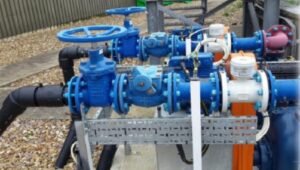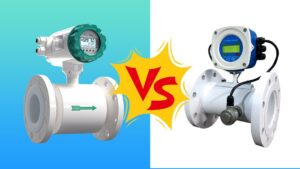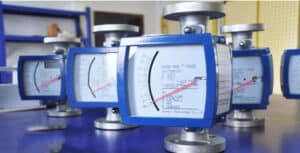In the world of wastewater treatment, accurate flow measurement is more than a technical detail — it’s the foundation of regulatory compliance, efficient operations, and environmental responsibility. With increasing demands for performance, reliability, and data traceability, magnetic flowmeters (also known as magmeters) are quickly becoming the preferred technology across municipal and industrial plants alike.
But are magnetic flowmeters truly worth the investment in a wastewater context? Let’s dive deep into the expert opinions, real-world performance, and long-term value they bring to water and wastewater systems.
What Are Magnetic Flowmeters and How Do They Work?
A magnetic flowmeter is a sensor that measures the volume of conductive fluids, such as wastewater, sludge, or effluent, by leveraging Faraday’s Law of Electromagnetic Induction. As dirty water passes through a magnetic field created within the flow tube, it generates a voltage. The strength of this voltage is directly proportional to the flow rate.
Key components include:
-
Magnetic coils
-

-
Electrodes
-
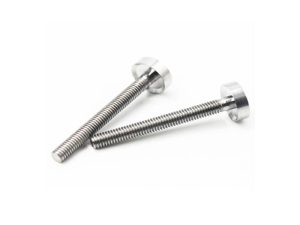
-
A flow tube with a protective liner
Unlike mechanical meters, there are no moving parts, making magmeters ideal for harsh and abrasive environments like those found in wastewater treatment facilities.
Why Magnetic Flowmeters Are Perfect for Wastewater Treatment
1. Handles Dirty, Abrasive, and Slurry Fluids
Wastewater often contains solid particles, sludge, chemicals, and suspended matter. Magnetic flowmeters are designed to function without obstruction, making them perfect for these conditions.
2. No Pressure Loss
Since the flow tube is completely open and free of internal obstructions, there’s zero pressure drop, even when dealing with thick or viscous fluids.
3. Maintenance-Free Operation
Wastewater treatment plants often run 24/7. Magmeters require little to no maintenance, which reduces downtime and keeps the system running smoothly.
4. Built to Last
With durable liners (like PTFE or hard rubber) and stainless-steel electrodes, magmeters resist the corrosive and abrasive nature of sewage and chemical-laden effluents.
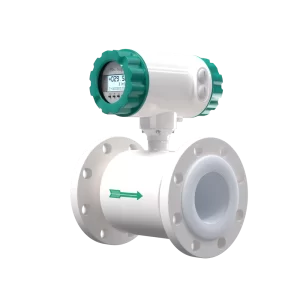
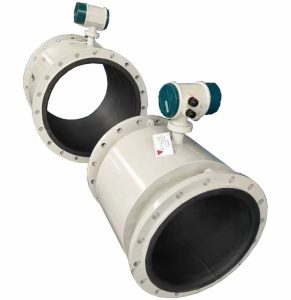
Common Wastewater Applications for Magnetic Flowmeters
Experts in the field recommend magmeters for various points in the treatment process, including:
-
Influent and Effluent Measurement – Accurate tracking of total flow volume entering or leaving the plant.
-
Sludge and Slurry Monitoring – Measurement of high-viscosity, solids-rich flows without clogging or loss of accuracy.
-
Chemical Dosing Systems – Tight control over the injection of coagulants, chlorine, or pH adjusters.
-
Pump Station Monitoring – Real-time flow feedback for smart pump control.
Expert Insight: What Wastewater Engineers Say
We spoke with engineers and maintenance leads at wastewater facilities, and here’s what they shared:
“We used to deal with frequent clogs and maintenance on our mechanical meters. Since switching to magmeters, we’ve cut downtime by 80%.”
— Facility Manager, Midwestern Wastewater Plant
“Accuracy is critical for our reporting to environmental agencies. Magmeters give us confidence in our numbers.”
— Process Control Engineer, Municipal Treatment Facility
“Even with heavy sludge, the magmeters keep performing. Zero maintenance in over three years.”
— Senior Technician, Industrial Effluent Plant
Their conclusion? Magmeters provide unmatched reliability for demanding wastewater applications.
Cost-Benefit Analysis in Wastewater Plants
While the initial cost of a magnetic flowmeter might be higher than traditional mechanical alternatives, the long-term savings are significant:
-
Less maintenance (no gears, paddles, or turbines to repair)
-
Lower labor costs
-
No parts replacement
-
Improved regulatory reporting
-
Better process efficiency
When evaluating total cost of ownership (TCO), many wastewater plants report ROI within 12–24 months of installation.
Features That Matter in Wastewater Applications
Not all magmeters are created equal. For wastewater treatment, experts recommend selecting meters with:
✔️ Rugged Liner Materials
PTFE or hard rubber liners resist chemicals, abrasion, and extreme pH levels.
✔️ Flush-Mounted Electrodes
Reduce fouling and buildup in dirty or high-solids applications.
✔️ Ingress Protection (IP67 or IP68)
Essential for underground pits or outdoor installations with exposure to moisture.
✔️ Advanced Diagnostics
Built-in alerts for empty pipe, grounding issues, or signal loss ensure fast troubleshooting.
Regulatory and Compliance Benefits
Accurate flow measurement is vital for compliance with:
-
EPA regulations
-
Discharge permits
-
Municipal and state reporting
A magmeter’s ability to log precise, tamper-resistant data helps utilities meet strict regulatory standards and avoid costly fines.
Real-World Case Study: City of Springfield, IL
Problem: Mechanical flowmeters were routinely clogging and causing inaccuracies in effluent flow reports.
Solution: Replaced 12 mechanical units with electromagnetic flowmeters from a reputable vendor.
Results:
-
35% improvement in data accuracy
-
Zero flowmeter maintenance calls in 2 years
-
Passed EPA audit with no reporting discrepancies
Future-Proofing Wastewater Infrastructure
The industry is moving toward digital transformation, and magnetic flowmeters are keeping pace with features like:
-
Remote monitoring via SCADA
-
Wireless communication modules
-
Predictive maintenance diagnostics
-
Battery-powered options for remote pump stations
These smart features turn magmeters into networked devices, capable of supporting real-time decision-making across the treatment process.
What to Watch Out For
Although magnetic flowmeters are highly reliable, here are a few watchpoints for wastewater facilities:
-
Ensure proper grounding to avoid signal noise.
-
Confirm the fluid’s conductivity exceeds the meter’s threshold (usually > 5 μS/cm).
-
Install with full pipe conditions to avoid erroneous readings.
Proper installation and commissioning by a qualified technician can eliminate nearly all performance issues.
Conclusion: Are Magnetic Flowmeters Worth It in Wastewater Treatment?
Yes — absolutely. Magnetic flowmeters offer unmatched accuracy, reliability, and longevity in the harsh environments typical of wastewater treatment facilities. From influent to effluent, from sludge to chemical dosing, magmeters provide precise flow measurement with minimal maintenance.
While the upfront cost is higher than mechanical options, the long-term return in efficiency, compliance, and peace of mind makes them well worth the investment.
If you’re planning to upgrade or expand your wastewater infrastructure, consider magnetic flowmeters not as a luxury, but as a smart, future-ready solution.

